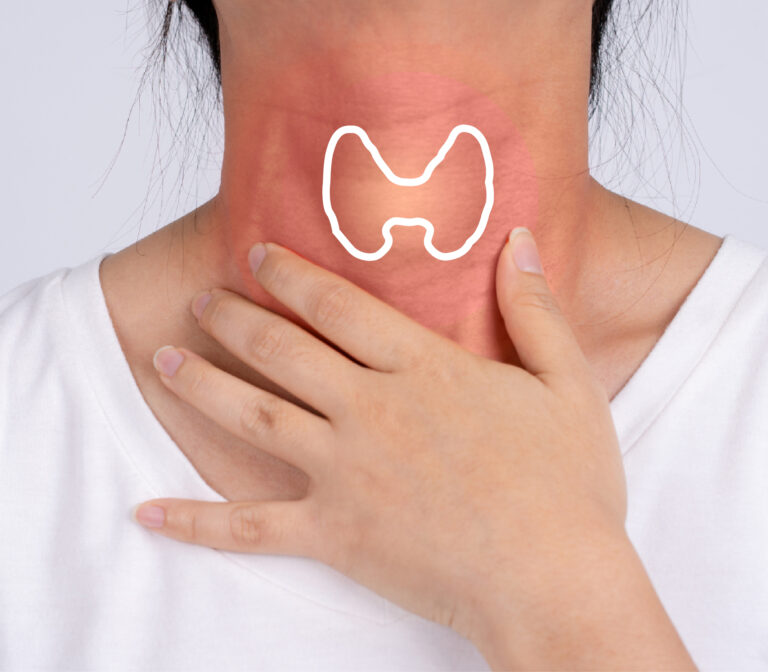Finding a lump or swollen neck is alarming, especially if you start to experience other symptoms like fatigue and weight changes.
You could have a thyroid goiter, which is a condition where your thyroid enlarges. But don’t be quick to assume it is thyroid cancer – there are other common, and less serious, conditions that could explain your swollen neck.
Read on to find out more about the types and possible causes of goiters, and whether it is a sign of thyroid cancer.

Understanding Types Of Thyroid Goiter
A goiter is a condition where the thyroid gland grows and swells, forming a visible lump in front of the neck. The thyroid gland is a small butterfly-shaped gland located in the neck region. As part of the endocrine system, the thyroid gland releases hormones to regulate various functions in the body such as metabolism, heart function, and bone development.
Goiters are categorised based on their causes and physical traits:
- Simple goiter: Entire thyroid gland swells
- Nodular goiter: A nodule, which is a solid or fluid-filled lump, grows on part of the thyroid gland
- Multinodular goiter: Growth of multiple nodules, forming a lumpy texture
- Toxic goiter: The goiter is caused by excess (hyperthyroidism) or insufficient (hyperthyroidism) thyroid hormones
- Nontoxic goiter: Goiter is caused by other non-hormone-related conditions
Goiters are more common than you think, as there are a variety of causes:
- Iodine deficiency: Iodine is a key ingredient to produce thyroid hormone. Insufficient iodine in your diet forces the thyroid gland to work harder to maximise iodine intake. The overwork can cause the thyroid to swell.
- Autoimmune diseases: Conditions like Graves’ disease and Hashimoto’s disease make our immune system attack the thyroid gland, causing hyperthyroidism and hypothyroidism respectively.
- Thyroiditis: It is an inflammation of the thyroid caused by infection, medication, or other conditions.
- Pregnancy: During pregnancy, the body produces more human chorionic gonadotropin (hCG) to support fetus growth. This hormone can also stimulate the thyroid, causing hyperthyroidism.
- Thyroid nodules or cancer: Nodules are lumps formed by an abnormal number of cells on the thyroid gland. Most nodules are benign, though some of them can develop into thyroid cancer.
While anyone can develop goiters, certain risk factors increase the odds of getting them:
- Obesity: Obesity could be a symptom of other conditions such as hormone imbalances and metabolic disorders which affect thyroid function.
- Insulin resistance: It is known to prevent the conversion of thyroid hormones from thyroxine (T4) to active triiodothyronine (T3), resulting in disrupting the healthy levels of thyroid hormones.
- Metabolic syndrome: As the thyroid is responsible for metabolic functions, irregularities in metabolism can lead to hyperthyroidism or hypothyroidism.
- Radiation: Increases the risk of thyroid cancer.
- Family history of thyroid diseases
Recognizing Symptoms of Thyroid Goiter
A goiter is usually painless, though it can feel tender. Other symptoms vary in intensity depending on the goiter size and how rapid it changes:
- Visible lump in front of the neck
- Difficulty swallowing
- Difficulty breathing
- Hoarseness
- Changes in voice
- Coughing and wheezing
Other symptoms can arise based on the cause of goiter formation. Too much or too little thyroid hormones have different effects on the body, though some symptoms may overlap:
Hyperthyroidism
Hypothyroidism
- Weight loss
- Frequent bowel movements
- Sensitive to heat
- Increased heart rate
- Anxious or agitated
- Weight gain
- Constipation
- Sensitive to cold
- Decreased heart rate
- Fatigue
Don’t be misled into thinking that pain is the best indication of a serious condition. Most goiters are painless, except for rare cases like inflammation (thyroiditis) and late-stage cancers.
Some people will not experience any symptoms other than a visible lump. In any case, you should book an appointment with your doctor should you notice any changes in your thyroid. Being more sensitive to your body changes gives you a better chance of early detection, which allows for early intervention.
Is Thyroid Swollen Neck A Warning Sign of Thyroid Cancer?
Majority of goiters are from non-cancerous conditions such as iodine deficiency, inflammation, or hormonal changes. In some cases, however, goiters can be a sign of thyroid cancer.
Thyroid cancer is indicated by the growth of a tumour in the thyroid, which causes the thyroid to swell and enlarge. Toxic nodular or multinodular goiters are associated with a higher risk of thyroid cancer. Thankfully, most nodules are benign, and the prognosis for thyroid cancer is positive. According to the Singapore Cancer Registry Report 2019, thyroid cancer is among the most common cancers with the highest survival rates.
With that said, having a goiter does not automatically mean you have thyroid cancer. The cause of goitre formation is indistinguishable to the naked eye. To determine the exact cause of your goitre, diagnostic tests are needed to extract the tissues of the goitres and test them for the presence of cancerous cells.

Seeking Professional Evaluation
If you notice a swollen neck and experience other symptoms such as difficulty breathing or swallowing, consult a healthcare professional for a diagnostic screening. Through a series of tests, the physician can confirm the cause and create a personalised plan to treat the problem.
At the Centre for Screening & Surgery, we provide thyroid screening that consists of:
Ultrasound scan
It is a non-invasive procedure that uses sound waves to obtain images of the structures of the body. For neck ultrasound, no dietary restriction is necessary prior to the ultrasound scan. You will be required to remove any jewellery and change into a gown.
During the examination, you will lie on your back with your neck extended slightly backwards. A gel will be applied to the skin over the neck region to allow the transmission of sound waves. A transducer, which is a device that emits sound waves, will move gently over the neck region to capture images of the thyroid gland.
The whole process will last from 15 to 30 minutes. The physician will review the images to note any swelling or nodules in the thyroid.
Ultrasound-guided biopsy
Also known as a thyroid fine-needle aspiration (FNA) biopsy, it is a procedure to obtain a small tissue sample of a suspicious thyroid nodule (larger than 1cm) detected during the ultrasound scan.
You may be given a local anaesthetic to numb the neck region. Like the ultrasound scan, a transducer is placed on the skin over the thyroid gland to guide the biopsy needle. A thin needle in inserted into the nodule, and a syringe is attached to the needle to extract a small tissue from it. The tissue sample is sent for analysis to determine if the nodule is benign or cancerous.
Blood Test
Blood tests are performed to check for certain thyroid hormones and antibodies. Abnormalities can indicate conditions like hypothyroidism or hyperthyroidism:
- Thyroid-stimulating hormone (TSH): This is a hormone produced by the pituitary gland, a part of the brain, that signals the thyroid to produce more thyroid hormones. When there are enough thyroid hormones, they will signal the pituitary gland to reduce TSH secretion.
If you have hyperthyroidism, the thyroid is already working excessively without the need for TSH, hence TSH levels should be low. The opposite trend occurs for hypothyroidism.
- Thyroxine (T4) and triiodothyronine (T3): T4 is a hormone that includes 4 iodine molecules. Once it is released into the bloodstream, the hormones lose one iodine to form T3, which regulates metabolism. Higher or lower levels of T4/T3 are signs of hyperthyroidism and hypothyroidism respectively.
- Thyroid antibodies: Elevated levels could indicate autoimmune conditions like Graves’ disease.
The process of a blood test is relatively simple, with no prior preparation required. It involves the insertion of a small needle into the vein of your arm to draw a small sample of blood, which will be taken to the lab for analysis. Once the physician receives your results, they will discuss the findings and treatment plans if required.
Treatment Options
Treatment plans vary depending on the type and size of thyroid goiters. Some goiters are benign and will resolve on their own, such as those caused by pregnancy hormones. Others may require medical intervention. A team of physicians will carefully evaluate the underlying causes and recommend a treatment plan specific to your needs. Treatments for goiters typically include:
Medication
Different types of medication are prescribed based on the treatment goal.
If your goiter is caused by hormonal imbalances, medications help to regulate your thyroid hormone levels:
- Thyroid hormone replacement pills: The pills are usually a replacement of T4 or T3 hormones to mitigate the effects of an underactive thyroid. They are also prescribed after thyroid removal surgery as the body can no longer produce them naturally.
- Hormone blockers: For patients with overactive thyroid, anti-thyroid drugs reduce hormone production. Drugs including atenolol (Tenormin) are beta blockers, which block the receptors in the cells to inactivate them so that they cannot produce more hormones.
People with painful goiters, typically from inflammation, are prescribed aspirin or other similar pain medication to ease the discomfort.
Surgery
Surgery is typically reserved for localised tumours or nodules that have affected breathing. Depending on the size and type of nodules, surgery is performed to remove the entire thyroid (thyroidectomy) or part of the thyroid where the nodule is found (thyroid lobectomy).
You may experience some temporary hoarseness after the surgery from possible irritation to the windpipe and vocal cords. The doctor will monitor them closely after the surgery to ensure they function properly.
If thyroidectomy is performed, you will need to take thyroid hormone replacement pills to ensure a healthy level of thyroid hormone for metabolic functions.
Radioactive iodine therapy (RAI)
RAI is a form of internal radiation therapy for overactive thyroid or thyroid cancer. Since the thyroid takes up iodine to produce thyroxine hormone, the intake of radioactive iodine either through injection or oral dose will be taken up by the thyroid. The radioactive iodine can destroy the cancerous cells or excess cells. This lowers hormone production and thyroid overactivity, which can decrease the swelling.
Prevention and Lifestyle Tips
One should take an active role in protecting their thyroid health; not just to avoid re-developing thyroid goiters but also to maintain your overall wellness. The good news is it’s not that complicated — here are some simple habits that you can adopt for a stronger thyroid:
Iodine-rich diet
Iodine is a vital mineral that helps the thyroid produce hormones. As our bodies do not produce iodine naturally, we need to pay more attention to our daily iodine intake. Adults are recommended to take 150 micrograms of iodine per day.
Iodine exists in many foods, especially if they are grown in iodine-rich environments such as seawater and coastal soils:
- Seafood such as tuna, cod, seaweed, shrimp
- Dairy products e.g. milk, yogurt, cheese, eggs
- Iodised salt
Alternatively, dietary supplements like potassium iodide or sodium iodide are options for people who wants a fixed daily intake of iodine.
Well-balanced Diet
Other than avoiding processed foods and eating clean, there are some foods to stray away from if you have certain conditions:
- Avoid eating vegetables raw, especially cruciferous vegetables such as cauliflowers ad cabbage. They are known to contain goitrogens, which are substances that disrupt the production of thyroid hormones.
- Cut down on gluten-rich food like grains especially if you have Hashimoto thyroiditis as excessive intake could encourage inflammation. Instead, focus on a mediterranean diet consisting of fruits, vegetables, beans, seafood, and nuts.
Exercise
Exercise is a good way to relieve symptoms of thyroid conditions such as weight fluctuations and fatigue. Additionally, a workout is a good way to rebuild your metabolism and cardiovascular health for overall fitness.
Try to do about 150 minutes of moderate to vigorous exercise per week; that’s only about 20 to 30 minutes per day! Pick something you like, be it pilates, brisk walking, running, sports – the options are endless!
However, if you have a thyroid or other medical conditions, check with your doctor on certain exercises you should avoid. Certain thyroid medications may cause an extremely high heart rate during intense exercise, which is best to avoid.
Conclusion
Thyroid goiters could indicate a myriad of problems. While most cases are due to iodine deficiency or hormonal imbalances, goiters could also be a symptom of thyroid cancer.
Do not jump to conclusions. The best way to know your condition is to seek professional help. By detecting and understanding the underlying causes early, timely treatment can be provided for a faster recovery.
If you experience swelling or discomfort in the neck, book an appointment at the Centre for Screening & Surgery at 64757133 today!



